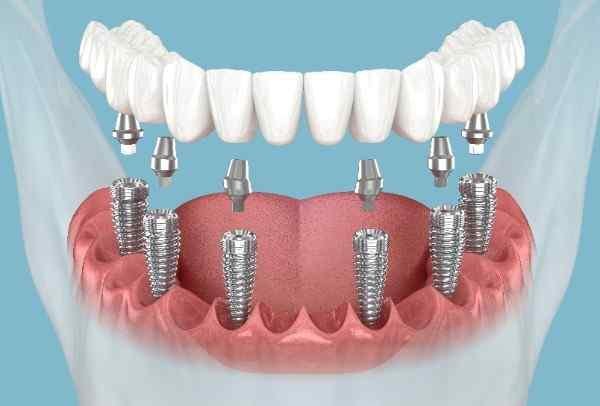Tooth loss is more common than many people realise, and it can affect much more than just your appearance. From difficulties in eating and speaking to a loss of self-confidence, the impact of missing teeth can be far-reaching. Dental implants have become one of the most effective and long-lasting solutions available, offering a stable and natural-looking replacement. Whether you have lost a single tooth or several, implants can help restore both function and aesthetics. In this guide, we’ll explore everything you need to know about dental implants, including how they work, the advantages they offer, and why choosing the right professional for your treatment is key to long-term success.
What Are Dental Implants?
A dental implant is a small titanium screw that is surgically positioned into the jawbone to serve as a strong, artificial root for a missing tooth. Over time, the implant naturally fuses with the bone in a process called osseointegration, creating a stable foundation. Once the area has healed, a custom-made crown, bridge, or denture can be securely attached, restoring both the function and appearance of natural teeth. Unlike traditional dentures that can slip or feel uncomfortable, implants remain fixed in place, making them feel far more natural and reliable. They not only improve chewing and speaking but also help maintain the health of your jawbone and surrounding teeth.
Why Choose Dental Implants Over Other Options?
Patients often compare dental implants with bridges or dentures. Here’s a simple breakdown:
| Treatment Option | Durability | Comfort & Fit | Effect on Surrounding Teeth |
| Dental Implants | 15–25 years (sometimes lifelong) | Feels natural, fixed in place | Preserves nearby teeth |
| Dental Bridges | 10–15 years | Good, but relies on adjacent teeth | Requires reshaping healthy teeth |
| Dentures | 5–10 years | May slip or feel loose | No impact on teeth, but less stable |
Disclaimer: Longevity varies based on oral hygiene, lifestyle, and professional care.
Clearly, dental implants are designed to provide a stronger, longer-lasting, and more natural solution.

The Dental Implant Procedure
The process usually takes place over several months and involves three main stages:
- Initial Consultation & Assessment – The dentist checks bone density, gum health, and suitability for the procedure.
- Implant Placement – The titanium screw is surgically inserted into the jawbone. Healing typically takes a few months as the implant fuses with the bone.
- Crown or Bridge Fitting – Once healed, a custom-made crown, bridge, or denture is attached for a natural finish.
This step-by-step process ensures long-term stability and a natural appearance.
Benefits of Dental Implants
Dental implants offer advantages that go beyond aesthetics:
- Improved confidence – No more worries about slipping dentures.
- Better oral health – Helps prevent bone loss in the jaw.
- Durability – With proper care, implants can last decades.
- Natural feel – Function and appearance mimic real teeth.
Unlike dentures, implants don’t need to be removed for cleaning, making daily oral care easier.
When to See an Emergency Dentist in Northampton
Not every dental concern requires immediate care, but certain situations do. If you’re considering implants, knowing when to seek urgent help is equally important.
You should contact an emergency dentist in Northampton if you experience:
- Sudden, severe toothache or swelling.
- Trauma leading to a knocked-out or fractured tooth.
- Persistent bleeding following a dental procedure.
In some cases, immediate care can increase the success rate of future treatments like dental implants.

Are You a Good Candidate for Dental Implants?
Dental Implant Northampton treatments are suitable for many people, but not everyone is an immediate candidate. To ensure long-term success, patients generally need healthy gums free from advanced gum disease and a strong jawbone with enough density to support the implant. It’s also important to be in good overall health, as uncontrolled conditions such as diabetes or heart disease can affect healing. Commitment to excellent oral hygiene and regular dental check-ups is another key factor in determining suitability. For those with a thinner or weaker jawbone, additional procedures like bone grafting may be advised before implant placement, helping to create a stable foundation for the implant to thrive.
Cost Considerations and Value for Money
The price of a dental implant Northampton treatment can vary depending on several factors, including the complexity of the case, the number of implants required, and whether additional procedures such as bone grafts or sinus lifts are needed to support the implant. While implants may appear more costly than alternatives such as dentures or bridges at first glance, they are designed to last much longer, often for decades with the right care. This durability means fewer replacements over time, making implants a more cost-effective solution in the long run. Beyond the financial aspect, patients also benefit from the added comfort, confidence, and improved oral health that implants provide, which many consider to be priceless.
Video Link: Affordable Dental Implants Northampton – Prices & Options
Aftercare and Long-Term Success
Looking after dental implants is very similar to caring for natural teeth, which makes them easy to maintain in the long term. Daily brushing and flossing, along with routine dental check-ups, are essential for keeping the implant and surrounding gums healthy. With the right care, implants can last for decades and, in many cases, even a lifetime. To support healing and ensure long-term success, patients are advised to avoid smoking, as it can slow recovery and increase the risk of complications. In the first few weeks after surgery, sticking to a softer diet can also help protect the implant site. Regular follow-up appointments with your dentist are equally important, as they allow early detection of any issues and provide reassurance that your implant is integrating as expected.
The Role of Emergency Care in Implant Success
Even after a successful implant placement, complications can occasionally arise, particularly if proper aftercare routines are not carefully followed. Issues such as infection, unexpected swelling, persistent pain, or accidental injury to the implant site may require immediate attention to prevent long-term problems. In such cases, prompt access to an emergency dentist in Northampton can make all the difference, helping to resolve issues quickly before they compromise the stability of the implant. Early intervention not only protects the implant itself but also supports the overall health of the gums and jawbone, ensuring that your investment in treatment continues to deliver lasting results. Having reliable emergency dental care available gives patients peace of mind, knowing that help is on hand if any unexpected concerns arise.
Conclusion
Dental implants remain one of the most advanced and reliable solutions for replacing missing teeth, combining strength, durability, and a natural appearance. Unlike traditional options, they not only restore your smile but also support long-term oral health and confidence. Whether you need to replace a single tooth or several, implants can make a life-changing difference. The key to success lies in choosing an experienced and trusted dental team and at EDN, we are committed to guiding you through every stage of your journey.

